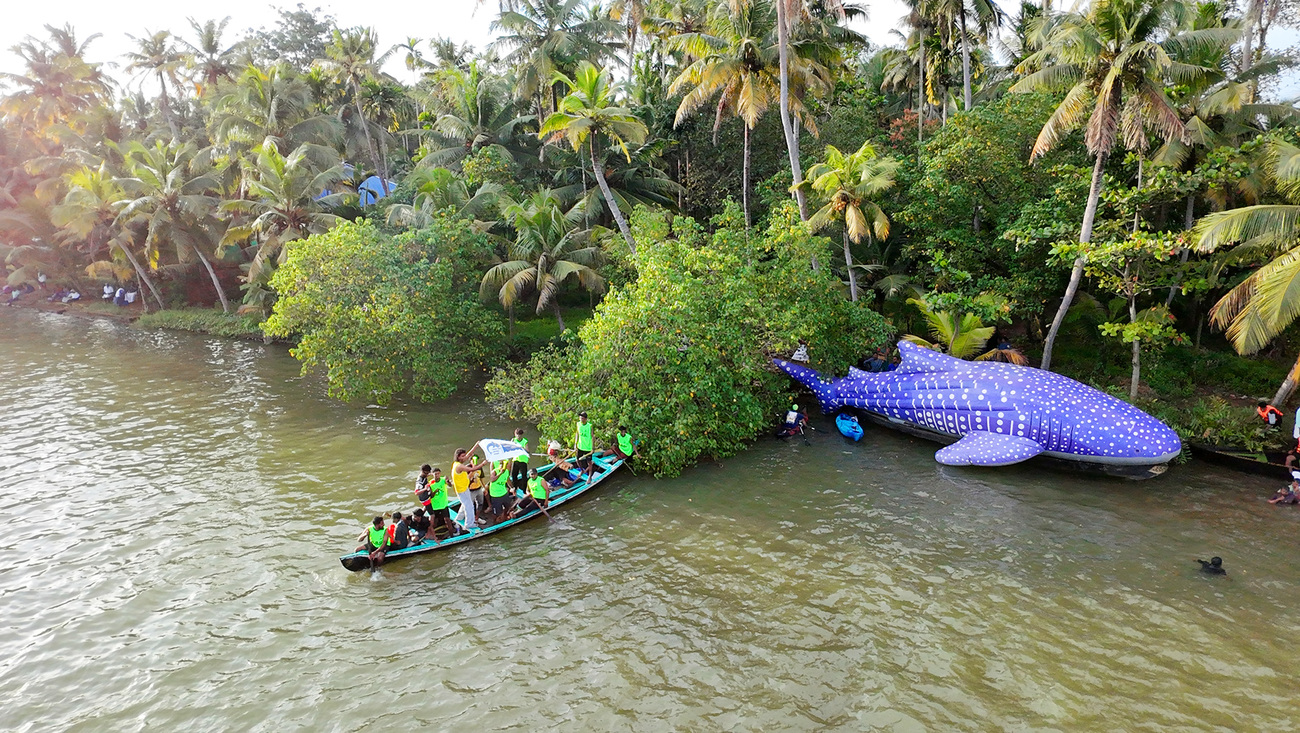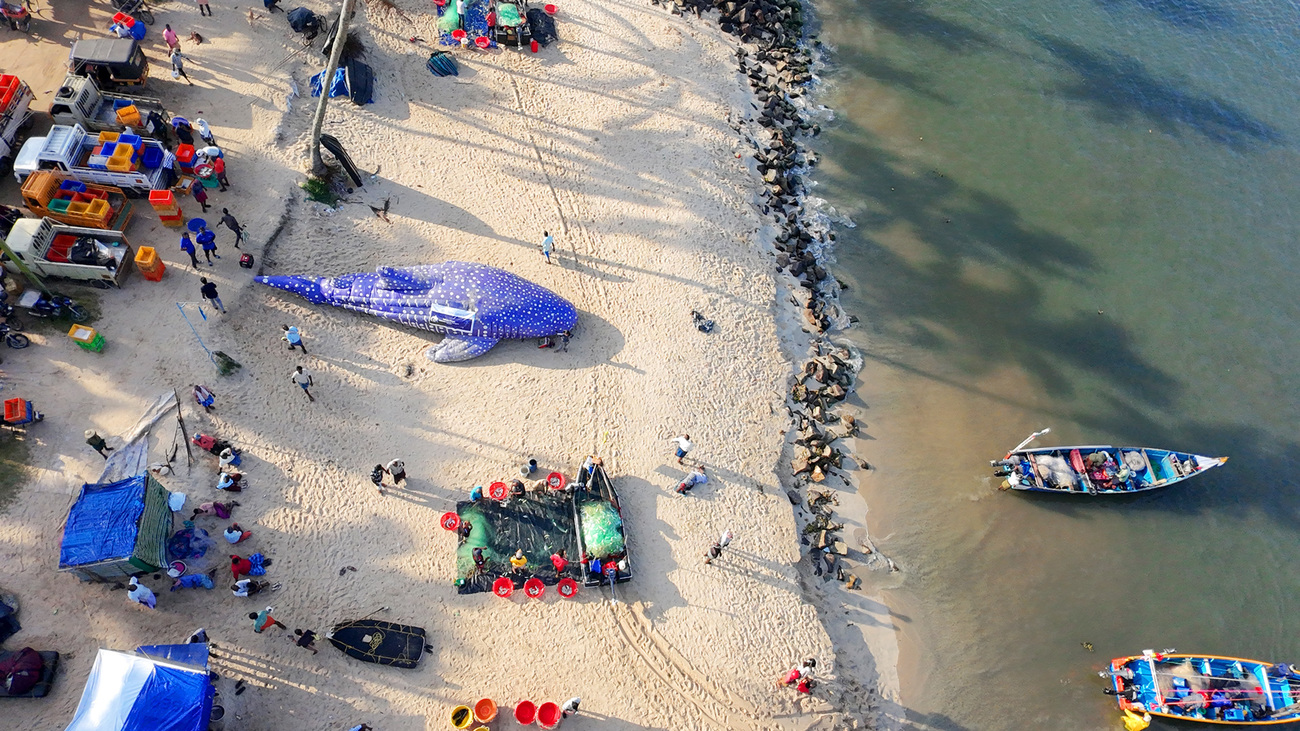Updates
IFAW rushes urgent support for vulnerable puffins after devastating floods in France
Read moreCommunities in conservation: protecting India’s whale sharks
There are few more compelling icons of ocean health than the majestic whale shark, the world’s largest fish and a gentle giant whose presence signals thriving marine ecosystems. For IFAW and our team at the Wildlife Trust of India (WTI), we believe that protecting such animals is not only about the species itself but how communities, governments, and conservation organisations together protect entire seascapes.

Since 2002, WTI has led efforts along the Gujarat coast to conserve whale sharks. Once hunted along the Saurashtra coastline, the species is now voluntarily protected by local fishers. Over the last 23 years, WTI, Gujarat’s fishing communities and the Gujarat Forest Department—supported by Tata Chemicals Society for Rural Development—have rescued and released 987 whale sharks. Among them, 18 were neonates, suggesting that Veraval and Sutrapada may be important breeding grounds. Through India’s first satellite tagging of whale sharks, researchers have mapped their movements as far as the Somali coast and the Maldives. These findings have underscored the need to expand conservation efforts beyond Gujarat to other Indian coastal regions. Building on these learnings from Gujarat, WTI launched the Whale Shark Conservation Project in Kerala and Lakshadweep in 2017.
Along Kerala’s coastline—where whale sharks are sighted occasionally and fishing is a way of life—WTI has been delivering a wide-reaching awareness campaign with support from Oracle. The aim is to reduce accidental entanglement in fishing nets, increase community understanding of the species, and encourage the voluntary rescue and release of trapped whale sharks.
These efforts place local communities at the centre of conservation. Fishers are often the first to spot or respond to a stranded whale shark. Their local knowledge, commitment, and pride in protecting marine life turn them into guardians of ocean biodiversity. Over the past seven years, 50 whale sharks have been rescued and released with the help of local fishers and WTI. This model transforms protection from an external directive into a shared responsibility.

In October 2025, at the IUCN World Conservation Congress in Abu Dhabi, WTI unveiled a landmark report titled “The Gentle Giants: Whale Shark Conservation in India (2002–2025)”. The report captures more than two decades of multi‑stakeholder work—spanning legal protections, community agreements, rescue‑release protocols, satellite tagging, photo‑identification, and the conversion of fishers into conservation champions.
This milestone is not just about recognition but about momentum. Two decades on, we’re shifting from keeping whale sharks afloat to enabling their populations to thrive, side by side with human communities living on the coast.
Individually, the Kerala‑coast campaign and the national review are strong stories. Together, they tell the full arc: from grassroots action to strategic evaluation.

The results so far are promising. Across Kerala, 257 awareness sessions have reached more than 204,000 fishers and over 100,000 children. Fishers have safely released dozens of entangled whale sharks and policy frameworks are helping to build long-term conservation strategies. Fishers who once viewed whale sharks as bycatch or a burden are now recognised as conservation heroes, cutting their nets to release the animals safely and contributing valuable sighting data.
On International Whale Shark Day 2025, the project expanded to Goa, where the state government announced a compensation of INR 75,000 for fishers who cut their nets to safely release protected species—particularly whale sharks, which are listed under Schedule I of the Wild Life (Protection) Act, 1972.
The release of the 20-year report marks the beginning of a new chapter—one that moves from reactive conservation to proactive protection of ocean ecosystems. It offers a clear opportunity to replicate and scale proven strategies from Gujarat and Kerala to other coastal states, to anticipate and mitigate threats like climate-driven habitat shifts, and to strengthen nationwide efforts to protect whale sharks and other marine life.
By empowering communities with better tools, building knowledge through science, and placing ocean biodiversity at the heart of national conversations, whale shark conservation is becoming a model for marine resilience—one that delivers impact for wildlife and people alike.
Every problem has a solution, every solution needs support.
The problems we face are urgent, complicated, and resistant to change. Real solutions demand creativity, hard work and involvement from people like you.
Unfortunately, the browser you use is outdated and does not allow you to display the site correctly. Please install any of the modern browsers, for example:
Google Chrome Firefox Safari